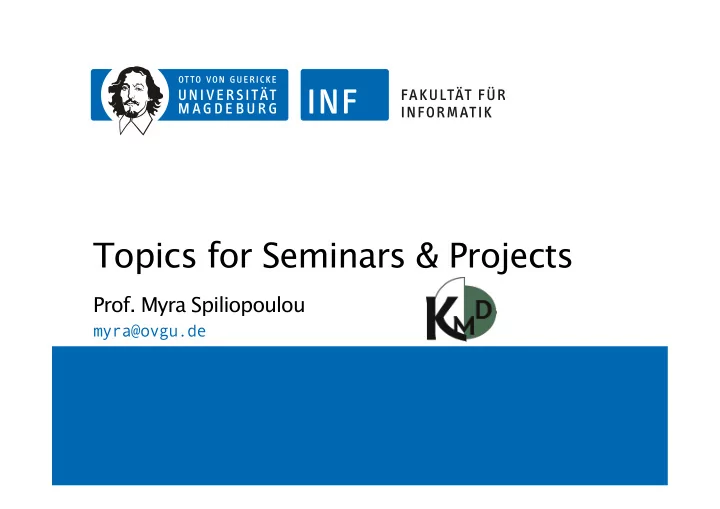

Topics for Seminars & Projects Prof. Myra Spiliopoulou myra@ovgu.de
Tim Timelin eline f e for s or sem emin inars ars an and projects d projects (Bach (Bachelor / Mas elor / Master) ter) • REG REGIS ISTRATIO TRATION: : § You decide for a topic, in agreement with the supervisor. § You sign the form and submit to the KMD team by Friday 19.10.17 • PR PRESENT ESENTAT ATIONS IONS fo for r semina seminars: rs: 22.01.2018, 09:00- 22.01.2018, 09:00-12:00 12:00 Attendance Attendance is is mandatory mandatory! • REP REPORT f RT for s or sem emin inars ars: 29.01.2018 till 13:00 s 29.01.2018 till 13:00 s.t. .t. • PR PRESENT ESENTAT ATIONS/ IONS/REPOR EPORT f for projects or projects: Febru : February 2018 ary 2018 ALL MEETINGS FROM NOW ON: KMD LAB (R 021) Myra Spiliopoulou – "Topics for Seminars and Projects" (2)
For Master DKE students: Teamprojects can be assigned to area "Methods I" only According to the statutes, it is not permissible that a teamproject is taken in the area "Fundamentals". This holds for all teamprojects. Myra Spiliopoulou – "Topics for Seminars and Projects" (3)
IT-Softwareprojects (Bachelor degrees only) Prerequisites for all projects of this type: § A team of THREE students § GOOD software engineering skills § Background: • Data mining / ML: at least one member • Data mining / ML / statistics: at least one member Myra Spiliopoulou – "Topics for Seminars and Projects" (4)
LEA- LEA-5: How 5: How do h do human ans learn s learn? Modelin ? Modeling clu cluster ev ster evolu olution tion This IT-softwareproject extends earlier projects. § LEA-1 built an interactive environment, with which the experimentator can observe the behaviour of experiment participants, as they form evolving groups during the experiment. § LEA-2 extended this environment with visualization aids and with constraint-based clustering. § LEA-3 built a testbed for the evaluation of the methods developed in LEA-2 under different parameter settings. Goal of LEA-5 is to build an online clustering algorithm for the testbed data records used in LEA-3 and provide an appropriate visualization for this algorithm. Myra Spiliopoulou – "Topics for Seminars and Projects" (5)
Teamproject (Master degrees only) Prerequisites for all projects of this type: § A team of THREE students § GOOD software engineering skills § Background in data mining / machine learning unless otherwise specified Myra Spiliopoulou – "Topics for Seminars and Projects" (6)
Priva Privacy cy-p -preserving reserving seq sequence uence mining mining Goal of this project is to expand a privacy-preserving kNN classification algorithm, originally intended for flat data records to an algorithm for the classification of multidimensional sequences. The teamproject encompasses 1. brief literature overview on the subject of privacy-preserving classification of flat data and on sequence data 2. design and implementation of the algorithm 3. specification of the evaluation criteria 4. design and implementation of a test environment, using public domain datasets 5. evaluation, discussion of the results and demonstration Myra Spiliopoulou – "Topics for Seminars and Projects" MDKE area: "Methods I" (7)
Fram Framew ework ork fo for Tim Time S e Series eries Im Impu putation tation Goal: implement a framework for imputing time series (univariate & multivariate, same length & different length) and evaluate the quality of the imputation in Java. Focus: exchangeability of imputation algorithms Prerequisites: 3 Students, Classification, UI-Design in Java The framework encompasses 4 components: 1. Loading and preparing the datasets (from UCR repository) 2. Imputation algorithms (uni- and multivariate) 3. Evaluation through RMSE and TSC 4. Visualisation of TS and Results Literature review of imputation algorithms, discussion of the results and demonstration Christian.beyer@ovgu.de Myra Spiliopoulou – "Topics for Seminars and Projects" MDKE area: „Methods 1" (8)
Seminars (Master level) Prerequisites for all seminars of this type: § Background in data mining / machine learning Myra Spiliopoulou – "Topics for Seminars and Projects" (9)
Se Semi mina nar sub subjects s 1. Predictive maintenance: the potential of neural networks MDKE area: "Fundamentals" 2. Predictive maintenance: the potential of bayesian networks MDKE area: "Fundamentals" 3. Kinetics in sports mining: recognizing movements with convolutional neural networks MDKE area: "Methods I" Myra Spiliopoulou – "Topics for Seminars and Projects" (10)
For each For each sem semin inar su ar subject bject TASK: Write a literature overview of the identified methods SUBTASKS: § Explain the learning task addressed by each method 1. Collect literature 2. Describe the formal problem solved by each method , focussing on commonalities among the methods. 3. Describe how each method works, focussing on differences among the methods. 4. Specify at least two criteria that allow you to compare methods. 5. For each criterion, explain which method is best and which methods are not performing well. The specification of search criteria for literature collection, the decision about relevance/irrelevance of each article and the specification of the comparison criteria are mission-critical. Myra Spiliopoulou – "Topics for Seminars and Projects" (11)
Thank you very much! Questions ? Myra Spiliopoulou – "Topics for Seminars and Projects" (12)
Recommend
More recommend